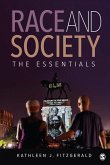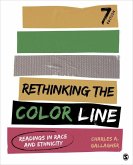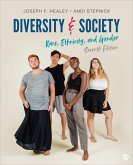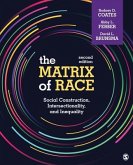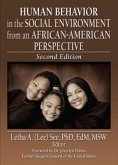- Broschiertes Buch
- Merkliste
- Auf die Merkliste
- Bewerten Bewerten
- Teilen
- Produkt teilen
- Produkterinnerung
- Produkterinnerung
This new edition reflects notable advances and important developments in the field over the last several years, and includes evidence-based practices for improving the overall well-being of African American communities.
Andere Kunden interessierten sich auch für
![Race and Society: The Essentials Race and Society: The Essentials]() Kathleen J FitzgeraldRace and Society: The Essentials90,99 €
Kathleen J FitzgeraldRace and Society: The Essentials90,99 €![Rethinking the Color Line Rethinking the Color Line]() Rethinking the Color Line199,99 €
Rethinking the Color Line199,99 €![Diversity and Society Diversity and Society]() Joseph F HealeyDiversity and Society169,99 €
Joseph F HealeyDiversity and Society169,99 €![Getting Real about Race Getting Real about Race]() Getting Real about Race83,99 €
Getting Real about Race83,99 €![The Matrix of Race The Matrix of Race]() Rodney D CoatesThe Matrix of Race198,99 €
Rodney D CoatesThe Matrix of Race198,99 €![Human Behavior in the Social Environment from an African-American Perspective Human Behavior in the Social Environment from an African-American Perspective]() Letha A SeeHuman Behavior in the Social Environment from an African-American Perspective86,99 €
Letha A SeeHuman Behavior in the Social Environment from an African-American Perspective86,99 €![Racial Ambiguity in Asian American Culture Racial Ambiguity in Asian American Culture]() Jennifer Ann HoRacial Ambiguity in Asian American Culture55,99 €
Jennifer Ann HoRacial Ambiguity in Asian American Culture55,99 €-
-
-
This new edition reflects notable advances and important developments in the field over the last several years, and includes evidence-based practices for improving the overall well-being of African American communities.
Hinweis: Dieser Artikel kann nur an eine deutsche Lieferadresse ausgeliefert werden.
Hinweis: Dieser Artikel kann nur an eine deutsche Lieferadresse ausgeliefert werden.
Produktdetails
- Produktdetails
- Verlag: Sage Publications
- 4th edition
- Seitenzahl: 640
- Erscheinungstermin: 21. Mai 2018
- Englisch
- Abmessung: 251mm x 178mm x 33mm
- Gewicht: 1111g
- ISBN-13: 9781506333403
- ISBN-10: 1506333400
- Artikelnr.: 50107711
- Herstellerkennzeichnung
- Libri GmbH
- Europaallee 1
- 36244 Bad Hersfeld
- gpsr@libri.de
- Verlag: Sage Publications
- 4th edition
- Seitenzahl: 640
- Erscheinungstermin: 21. Mai 2018
- Englisch
- Abmessung: 251mm x 178mm x 33mm
- Gewicht: 1111g
- ISBN-13: 9781506333403
- ISBN-10: 1506333400
- Artikelnr.: 50107711
- Herstellerkennzeichnung
- Libri GmbH
- Europaallee 1
- 36244 Bad Hersfeld
- gpsr@libri.de
Faye Z. Belgrave is Professor of Psychology at Virginia Commonwealth University and the Founding Director of the Center for Cultural Experiences in Prevention. Her programmatic and research interests are in the areas of health disparities, including drug and HIV prevention among African Americans and other ethnic minorities. Dr. Belgrave's research also focuses on the role of culture and context in prevention interventions, on women's health, and gender related issues. Much of her work has been conducted in collaboration with community-based organizations. Dr. Belgrave is an invited speaker on the topics of African American culture, and community based evaluation and research. She has received numerous awards and recognition for her research, teaching, and service including a Lifetime Achievement award from the American Psychological Association and a Distinguished Psychologists Award from the Association of Black Psychologists.
Preface
Acknowledgments
About the Authors
SECTION I. INTRODUCTION AND HISTORICAL FOUNDATION
Chapter 1. Introduction to African American Psychology
Introduction, Definitions, and Conceptual Frameworks
Historical Perspective on the Psychological Study of African Americans
Study of African Americans in American Psychology
Self-Determination
Status of African American Psychology Today
Methodological and Research Issues
Critical Analysis
Summary
Chapter 2. African-Centered Psychology
Introduction to African-Centered Psychology and the Africentric Worldview
African American Psychologists and African-Centered Psychology
African Philosophy
African-Centered Research With African Americans
Methodological and Research Issues
Empirically Based Programs in Africentric Psychology
Critical Analysis
Summary
Chapter 3. Self-Attributes and Identity
Introductions, Definitions, and Conceptual Framework
Self-Concept Among African Americans
Identity: Development and Change
Models of Racial Identity
Sexual Identity
Acculturation, Racial Socialization, Gender Roles, and Masculinity
Methodological and Research Issues
Best Practices for Increasing Positive Racial and Ethnic Identity and
Racial Socialization
Critical Analysis
Summary
Chapter 4. Race and Racism
Introduction, Definitions, and Historical Overview
Types of Racism
Consequences of Racism
Coping With Racism
Methodological and Research Issues
Evidenced-Based and Promising Practices for Reducing Racism
Critical Analysis
Summary
SECTION II. SOCIAL SYSTEMS AND STRUCTURES
Chapter 5. Kinship and Family
Definitions and Historical Background on African American Families
African American Family Structure
What Does the African American Family Look Like?
Strengths, Coping, and Parenting Patterns
Methodological and Research Issues
Evidenced-Based Practices for Strengthening African American Families
Critical Analysis
Summary
Chapter 6. Education and Work
Introduction and Overview
Research on the Educational Experiences of African Americans
Culture and Noncognitive Factors in Education
Perspectives on Work, Career, Vocations, and Employment
Methodological and Research Issues
Evidence-Based Practices for Improving Educational Outcomes
Critical Analysis
Summary
Chapter 7. Neighborhoods and Communities
Introduction and Overview
Demographic and Historical Perspectives on the African American Community
Theoretical Perspectives on Communities
Research on African American Communities
Methodological and Research Issues
Empirically Supported Practices and Policy for Community and Neighborhood
Improvement
Critical Analysis
Summary
SECTION III. INDIVIDUAL AND DEVELOPMENTAL PROCESSES
Chapter 8. Interpersonal and Close Relationships
Introduction, Definitions, and Historical Perspectives
Friendships and Peer Relationships
Romantic Relationships
Interpersonal Attraction
Interracial Attitudes, Friendships, and Relationships
Lesbian, Gay, Bisexual, Transgender, and Queer (LGBTQ) Relationships
Methodological and Research Issues
Best Practices for Improving Relationships
Critical Analysis
Summary
Chapter 9. Cognition, Learning, and Language
Introduction, Definitions, and Historical Framework
Cognitive Styles
Learning Styles
Language
Methodological and Research Issues
Promising Practices for Increasing Cognitive and Language Skills
Critical Analysis
Summary
Chapter 10. Religion and Spirituality
Introduction, Definitions, and Background
Historical Influences
Contemporary African American Churches
The Black MegaChurch
Spirituality, Religion, and Well-Being
Contemporary Topics
Methodological and Research Issues
Empirically Based Practices Using Religion and Spirituality
Critical Analysis
Summary
Chapter 11. Life Span Development
Introduction and Definitions
Demographics
Theoretical Perspectives on the Development of African Americans
Research on the Development of African Americans
Methodological and Research Issues
Best Practices and Promising Interventions for Improving Developmental
Outcomes
Critical Analysis
Summary
SECTION IV. ADJUSTMENT AND ADAPTATION
Chapter 12. Health, Illness, and Disability
Introduction, Definitions, and Background
Health Promotion, Disease Prevention, and Health Care Utilization
Models of Health and Illness Behaviors
Cultural Models of Health and Illness
Selected Health and Illness Conditions Among African Americans
Methodological and Research Issues
Empirically Supported Practices for Reducing Morbidity and Mortality
Critical Analysis
Summary
Chapter 13. Psychosocial Adaptation and Mental Health
Introduction and Definitions
Theoretical Perspectives on Psychological Adaptation and Dysfunction Among
African Americans
Data on Mental Health of African Americans
Research on the Role of Culture, Identity, and Discrimination in Well-Being
Methodological and Research Issues
Promising and Evidence-Based Practices for Improving Mental Health Outcomes
Critical Analysis
Summary
Chapter 14. Drug Use and Abuse
Introductions, Definitions, and Historical Perspectives
Current Drug Use Among African Americans
Diversity in Substance Use and Abuse Among Blacks
Causes and Consequences of Drug Use
Methodological and Research Issues
Best Practices for Preventing and Treating Drug Use
Critical Analysis
Summary
Chapter 15. Prosocial and Antisocial Behavior
Introduction
Prosocial Behavior
Antisocial Behavior
Methodological and Research Issues
Best Practices for Increasing Prosocial Behavior and Decreasing Antisocial
Behavior
Critical Analysis
Summary
References
Author Index
Subject Index
Acknowledgments
About the Authors
SECTION I. INTRODUCTION AND HISTORICAL FOUNDATION
Chapter 1. Introduction to African American Psychology
Introduction, Definitions, and Conceptual Frameworks
Historical Perspective on the Psychological Study of African Americans
Study of African Americans in American Psychology
Self-Determination
Status of African American Psychology Today
Methodological and Research Issues
Critical Analysis
Summary
Chapter 2. African-Centered Psychology
Introduction to African-Centered Psychology and the Africentric Worldview
African American Psychologists and African-Centered Psychology
African Philosophy
African-Centered Research With African Americans
Methodological and Research Issues
Empirically Based Programs in Africentric Psychology
Critical Analysis
Summary
Chapter 3. Self-Attributes and Identity
Introductions, Definitions, and Conceptual Framework
Self-Concept Among African Americans
Identity: Development and Change
Models of Racial Identity
Sexual Identity
Acculturation, Racial Socialization, Gender Roles, and Masculinity
Methodological and Research Issues
Best Practices for Increasing Positive Racial and Ethnic Identity and
Racial Socialization
Critical Analysis
Summary
Chapter 4. Race and Racism
Introduction, Definitions, and Historical Overview
Types of Racism
Consequences of Racism
Coping With Racism
Methodological and Research Issues
Evidenced-Based and Promising Practices for Reducing Racism
Critical Analysis
Summary
SECTION II. SOCIAL SYSTEMS AND STRUCTURES
Chapter 5. Kinship and Family
Definitions and Historical Background on African American Families
African American Family Structure
What Does the African American Family Look Like?
Strengths, Coping, and Parenting Patterns
Methodological and Research Issues
Evidenced-Based Practices for Strengthening African American Families
Critical Analysis
Summary
Chapter 6. Education and Work
Introduction and Overview
Research on the Educational Experiences of African Americans
Culture and Noncognitive Factors in Education
Perspectives on Work, Career, Vocations, and Employment
Methodological and Research Issues
Evidence-Based Practices for Improving Educational Outcomes
Critical Analysis
Summary
Chapter 7. Neighborhoods and Communities
Introduction and Overview
Demographic and Historical Perspectives on the African American Community
Theoretical Perspectives on Communities
Research on African American Communities
Methodological and Research Issues
Empirically Supported Practices and Policy for Community and Neighborhood
Improvement
Critical Analysis
Summary
SECTION III. INDIVIDUAL AND DEVELOPMENTAL PROCESSES
Chapter 8. Interpersonal and Close Relationships
Introduction, Definitions, and Historical Perspectives
Friendships and Peer Relationships
Romantic Relationships
Interpersonal Attraction
Interracial Attitudes, Friendships, and Relationships
Lesbian, Gay, Bisexual, Transgender, and Queer (LGBTQ) Relationships
Methodological and Research Issues
Best Practices for Improving Relationships
Critical Analysis
Summary
Chapter 9. Cognition, Learning, and Language
Introduction, Definitions, and Historical Framework
Cognitive Styles
Learning Styles
Language
Methodological and Research Issues
Promising Practices for Increasing Cognitive and Language Skills
Critical Analysis
Summary
Chapter 10. Religion and Spirituality
Introduction, Definitions, and Background
Historical Influences
Contemporary African American Churches
The Black MegaChurch
Spirituality, Religion, and Well-Being
Contemporary Topics
Methodological and Research Issues
Empirically Based Practices Using Religion and Spirituality
Critical Analysis
Summary
Chapter 11. Life Span Development
Introduction and Definitions
Demographics
Theoretical Perspectives on the Development of African Americans
Research on the Development of African Americans
Methodological and Research Issues
Best Practices and Promising Interventions for Improving Developmental
Outcomes
Critical Analysis
Summary
SECTION IV. ADJUSTMENT AND ADAPTATION
Chapter 12. Health, Illness, and Disability
Introduction, Definitions, and Background
Health Promotion, Disease Prevention, and Health Care Utilization
Models of Health and Illness Behaviors
Cultural Models of Health and Illness
Selected Health and Illness Conditions Among African Americans
Methodological and Research Issues
Empirically Supported Practices for Reducing Morbidity and Mortality
Critical Analysis
Summary
Chapter 13. Psychosocial Adaptation and Mental Health
Introduction and Definitions
Theoretical Perspectives on Psychological Adaptation and Dysfunction Among
African Americans
Data on Mental Health of African Americans
Research on the Role of Culture, Identity, and Discrimination in Well-Being
Methodological and Research Issues
Promising and Evidence-Based Practices for Improving Mental Health Outcomes
Critical Analysis
Summary
Chapter 14. Drug Use and Abuse
Introductions, Definitions, and Historical Perspectives
Current Drug Use Among African Americans
Diversity in Substance Use and Abuse Among Blacks
Causes and Consequences of Drug Use
Methodological and Research Issues
Best Practices for Preventing and Treating Drug Use
Critical Analysis
Summary
Chapter 15. Prosocial and Antisocial Behavior
Introduction
Prosocial Behavior
Antisocial Behavior
Methodological and Research Issues
Best Practices for Increasing Prosocial Behavior and Decreasing Antisocial
Behavior
Critical Analysis
Summary
References
Author Index
Subject Index
Preface
Acknowledgments
About the Authors
SECTION I. INTRODUCTION AND HISTORICAL FOUNDATION
Chapter 1. Introduction to African American Psychology
Introduction, Definitions, and Conceptual Frameworks
Historical Perspective on the Psychological Study of African Americans
Study of African Americans in American Psychology
Self-Determination
Status of African American Psychology Today
Methodological and Research Issues
Critical Analysis
Summary
Chapter 2. African-Centered Psychology
Introduction to African-Centered Psychology and the Africentric Worldview
African American Psychologists and African-Centered Psychology
African Philosophy
African-Centered Research With African Americans
Methodological and Research Issues
Empirically Based Programs in Africentric Psychology
Critical Analysis
Summary
Chapter 3. Self-Attributes and Identity
Introductions, Definitions, and Conceptual Framework
Self-Concept Among African Americans
Identity: Development and Change
Models of Racial Identity
Sexual Identity
Acculturation, Racial Socialization, Gender Roles, and Masculinity
Methodological and Research Issues
Best Practices for Increasing Positive Racial and Ethnic Identity and
Racial Socialization
Critical Analysis
Summary
Chapter 4. Race and Racism
Introduction, Definitions, and Historical Overview
Types of Racism
Consequences of Racism
Coping With Racism
Methodological and Research Issues
Evidenced-Based and Promising Practices for Reducing Racism
Critical Analysis
Summary
SECTION II. SOCIAL SYSTEMS AND STRUCTURES
Chapter 5. Kinship and Family
Definitions and Historical Background on African American Families
African American Family Structure
What Does the African American Family Look Like?
Strengths, Coping, and Parenting Patterns
Methodological and Research Issues
Evidenced-Based Practices for Strengthening African American Families
Critical Analysis
Summary
Chapter 6. Education and Work
Introduction and Overview
Research on the Educational Experiences of African Americans
Culture and Noncognitive Factors in Education
Perspectives on Work, Career, Vocations, and Employment
Methodological and Research Issues
Evidence-Based Practices for Improving Educational Outcomes
Critical Analysis
Summary
Chapter 7. Neighborhoods and Communities
Introduction and Overview
Demographic and Historical Perspectives on the African American Community
Theoretical Perspectives on Communities
Research on African American Communities
Methodological and Research Issues
Empirically Supported Practices and Policy for Community and Neighborhood
Improvement
Critical Analysis
Summary
SECTION III. INDIVIDUAL AND DEVELOPMENTAL PROCESSES
Chapter 8. Interpersonal and Close Relationships
Introduction, Definitions, and Historical Perspectives
Friendships and Peer Relationships
Romantic Relationships
Interpersonal Attraction
Interracial Attitudes, Friendships, and Relationships
Lesbian, Gay, Bisexual, Transgender, and Queer (LGBTQ) Relationships
Methodological and Research Issues
Best Practices for Improving Relationships
Critical Analysis
Summary
Chapter 9. Cognition, Learning, and Language
Introduction, Definitions, and Historical Framework
Cognitive Styles
Learning Styles
Language
Methodological and Research Issues
Promising Practices for Increasing Cognitive and Language Skills
Critical Analysis
Summary
Chapter 10. Religion and Spirituality
Introduction, Definitions, and Background
Historical Influences
Contemporary African American Churches
The Black MegaChurch
Spirituality, Religion, and Well-Being
Contemporary Topics
Methodological and Research Issues
Empirically Based Practices Using Religion and Spirituality
Critical Analysis
Summary
Chapter 11. Life Span Development
Introduction and Definitions
Demographics
Theoretical Perspectives on the Development of African Americans
Research on the Development of African Americans
Methodological and Research Issues
Best Practices and Promising Interventions for Improving Developmental
Outcomes
Critical Analysis
Summary
SECTION IV. ADJUSTMENT AND ADAPTATION
Chapter 12. Health, Illness, and Disability
Introduction, Definitions, and Background
Health Promotion, Disease Prevention, and Health Care Utilization
Models of Health and Illness Behaviors
Cultural Models of Health and Illness
Selected Health and Illness Conditions Among African Americans
Methodological and Research Issues
Empirically Supported Practices for Reducing Morbidity and Mortality
Critical Analysis
Summary
Chapter 13. Psychosocial Adaptation and Mental Health
Introduction and Definitions
Theoretical Perspectives on Psychological Adaptation and Dysfunction Among
African Americans
Data on Mental Health of African Americans
Research on the Role of Culture, Identity, and Discrimination in Well-Being
Methodological and Research Issues
Promising and Evidence-Based Practices for Improving Mental Health Outcomes
Critical Analysis
Summary
Chapter 14. Drug Use and Abuse
Introductions, Definitions, and Historical Perspectives
Current Drug Use Among African Americans
Diversity in Substance Use and Abuse Among Blacks
Causes and Consequences of Drug Use
Methodological and Research Issues
Best Practices for Preventing and Treating Drug Use
Critical Analysis
Summary
Chapter 15. Prosocial and Antisocial Behavior
Introduction
Prosocial Behavior
Antisocial Behavior
Methodological and Research Issues
Best Practices for Increasing Prosocial Behavior and Decreasing Antisocial
Behavior
Critical Analysis
Summary
References
Author Index
Subject Index
Acknowledgments
About the Authors
SECTION I. INTRODUCTION AND HISTORICAL FOUNDATION
Chapter 1. Introduction to African American Psychology
Introduction, Definitions, and Conceptual Frameworks
Historical Perspective on the Psychological Study of African Americans
Study of African Americans in American Psychology
Self-Determination
Status of African American Psychology Today
Methodological and Research Issues
Critical Analysis
Summary
Chapter 2. African-Centered Psychology
Introduction to African-Centered Psychology and the Africentric Worldview
African American Psychologists and African-Centered Psychology
African Philosophy
African-Centered Research With African Americans
Methodological and Research Issues
Empirically Based Programs in Africentric Psychology
Critical Analysis
Summary
Chapter 3. Self-Attributes and Identity
Introductions, Definitions, and Conceptual Framework
Self-Concept Among African Americans
Identity: Development and Change
Models of Racial Identity
Sexual Identity
Acculturation, Racial Socialization, Gender Roles, and Masculinity
Methodological and Research Issues
Best Practices for Increasing Positive Racial and Ethnic Identity and
Racial Socialization
Critical Analysis
Summary
Chapter 4. Race and Racism
Introduction, Definitions, and Historical Overview
Types of Racism
Consequences of Racism
Coping With Racism
Methodological and Research Issues
Evidenced-Based and Promising Practices for Reducing Racism
Critical Analysis
Summary
SECTION II. SOCIAL SYSTEMS AND STRUCTURES
Chapter 5. Kinship and Family
Definitions and Historical Background on African American Families
African American Family Structure
What Does the African American Family Look Like?
Strengths, Coping, and Parenting Patterns
Methodological and Research Issues
Evidenced-Based Practices for Strengthening African American Families
Critical Analysis
Summary
Chapter 6. Education and Work
Introduction and Overview
Research on the Educational Experiences of African Americans
Culture and Noncognitive Factors in Education
Perspectives on Work, Career, Vocations, and Employment
Methodological and Research Issues
Evidence-Based Practices for Improving Educational Outcomes
Critical Analysis
Summary
Chapter 7. Neighborhoods and Communities
Introduction and Overview
Demographic and Historical Perspectives on the African American Community
Theoretical Perspectives on Communities
Research on African American Communities
Methodological and Research Issues
Empirically Supported Practices and Policy for Community and Neighborhood
Improvement
Critical Analysis
Summary
SECTION III. INDIVIDUAL AND DEVELOPMENTAL PROCESSES
Chapter 8. Interpersonal and Close Relationships
Introduction, Definitions, and Historical Perspectives
Friendships and Peer Relationships
Romantic Relationships
Interpersonal Attraction
Interracial Attitudes, Friendships, and Relationships
Lesbian, Gay, Bisexual, Transgender, and Queer (LGBTQ) Relationships
Methodological and Research Issues
Best Practices for Improving Relationships
Critical Analysis
Summary
Chapter 9. Cognition, Learning, and Language
Introduction, Definitions, and Historical Framework
Cognitive Styles
Learning Styles
Language
Methodological and Research Issues
Promising Practices for Increasing Cognitive and Language Skills
Critical Analysis
Summary
Chapter 10. Religion and Spirituality
Introduction, Definitions, and Background
Historical Influences
Contemporary African American Churches
The Black MegaChurch
Spirituality, Religion, and Well-Being
Contemporary Topics
Methodological and Research Issues
Empirically Based Practices Using Religion and Spirituality
Critical Analysis
Summary
Chapter 11. Life Span Development
Introduction and Definitions
Demographics
Theoretical Perspectives on the Development of African Americans
Research on the Development of African Americans
Methodological and Research Issues
Best Practices and Promising Interventions for Improving Developmental
Outcomes
Critical Analysis
Summary
SECTION IV. ADJUSTMENT AND ADAPTATION
Chapter 12. Health, Illness, and Disability
Introduction, Definitions, and Background
Health Promotion, Disease Prevention, and Health Care Utilization
Models of Health and Illness Behaviors
Cultural Models of Health and Illness
Selected Health and Illness Conditions Among African Americans
Methodological and Research Issues
Empirically Supported Practices for Reducing Morbidity and Mortality
Critical Analysis
Summary
Chapter 13. Psychosocial Adaptation and Mental Health
Introduction and Definitions
Theoretical Perspectives on Psychological Adaptation and Dysfunction Among
African Americans
Data on Mental Health of African Americans
Research on the Role of Culture, Identity, and Discrimination in Well-Being
Methodological and Research Issues
Promising and Evidence-Based Practices for Improving Mental Health Outcomes
Critical Analysis
Summary
Chapter 14. Drug Use and Abuse
Introductions, Definitions, and Historical Perspectives
Current Drug Use Among African Americans
Diversity in Substance Use and Abuse Among Blacks
Causes and Consequences of Drug Use
Methodological and Research Issues
Best Practices for Preventing and Treating Drug Use
Critical Analysis
Summary
Chapter 15. Prosocial and Antisocial Behavior
Introduction
Prosocial Behavior
Antisocial Behavior
Methodological and Research Issues
Best Practices for Increasing Prosocial Behavior and Decreasing Antisocial
Behavior
Critical Analysis
Summary
References
Author Index
Subject Index


